Why a square mile in Massachusetts is beating Britain in engineering biology
What do an Impossible Burger, the Covid vaccine, and Coca Cola's PlantBottle have in common? They're all a result of engineering biology – a field that brings together biology, engineering and increasingly AI to create new products and processes.
Britain is already pretty good at it. We're fourth in the world for research impact and have more engineering biology start-ups than anywhere else in Europe.
We’ve been home to some incredible breakthroughs lately: DeepMind’s AlphaFold models can predict the structure of “all of life’s molecules,” claiming to save a billion years of research time and massively increase the pace of drug discovery.
But as we've argued in the rest of this series, we're still spreading our bets too thinly, failing to invest in the right public goods, and not getting Government out of the way enough. Other countries are roaring ahead. One corner of Cambridge, Massachusetts, the Kendall Square biotech cluster – dubbed “the most innovative square mile on the planet” – has 600 start-ups and $14 billion in venture capital.
And while we’re strong on research, much of this is down to a select few institutions. British biotech companies lag on patents too, with only eight for every thousand publications, compared to 54 for the US and 31 for France.
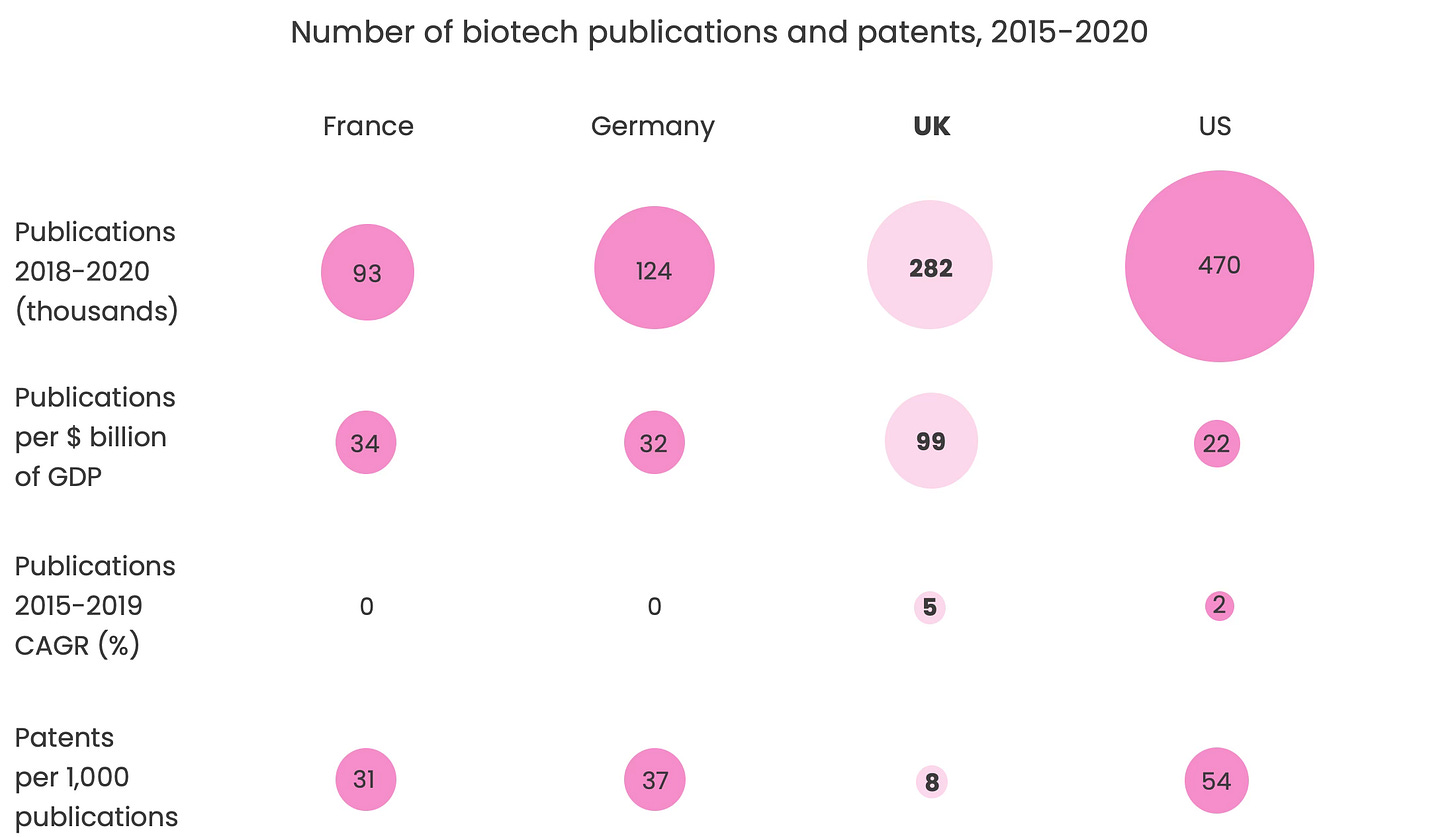
Biotech is at a tipping point, where soon these nascent inventions won’t be confined to the lab but will hit the marketplace. We can’t afford to miss out on this huge opportunity, yet as the Government’s Council for Science and Technology recently warned, we risk losing out unless the UK urgently addresses key blockers such as infrastructure and skills.
As Onward has argued before, the UK needs to do three things to lead in frontier technologies: first, harness the niches where it can develop an edge; second, invest in key public goods; and third, get out of the way of private enterprise.
1. Finding a niche
We could just double down on health applications of engineering biology. Cambridge is home to Silicon Fen, Europe’s largest life sciences cluster. We have a molecular biology lab that is one of the top research paper contributors in the world, particularly in health. The field holds great promise, potentially reaching $1 trillion annually in the coming decades.
But while important – and initiatives like the Government’s £100 million AI Life Sciences Accelerator Mission are good – we shouldn’t focus solely on health. Because Britain’s biotech companies are bustling with innovation across a whole host of fronts, from food to fuels.
We also lead Europe in start-ups engaged in alternative proteins and bio-based plastics.
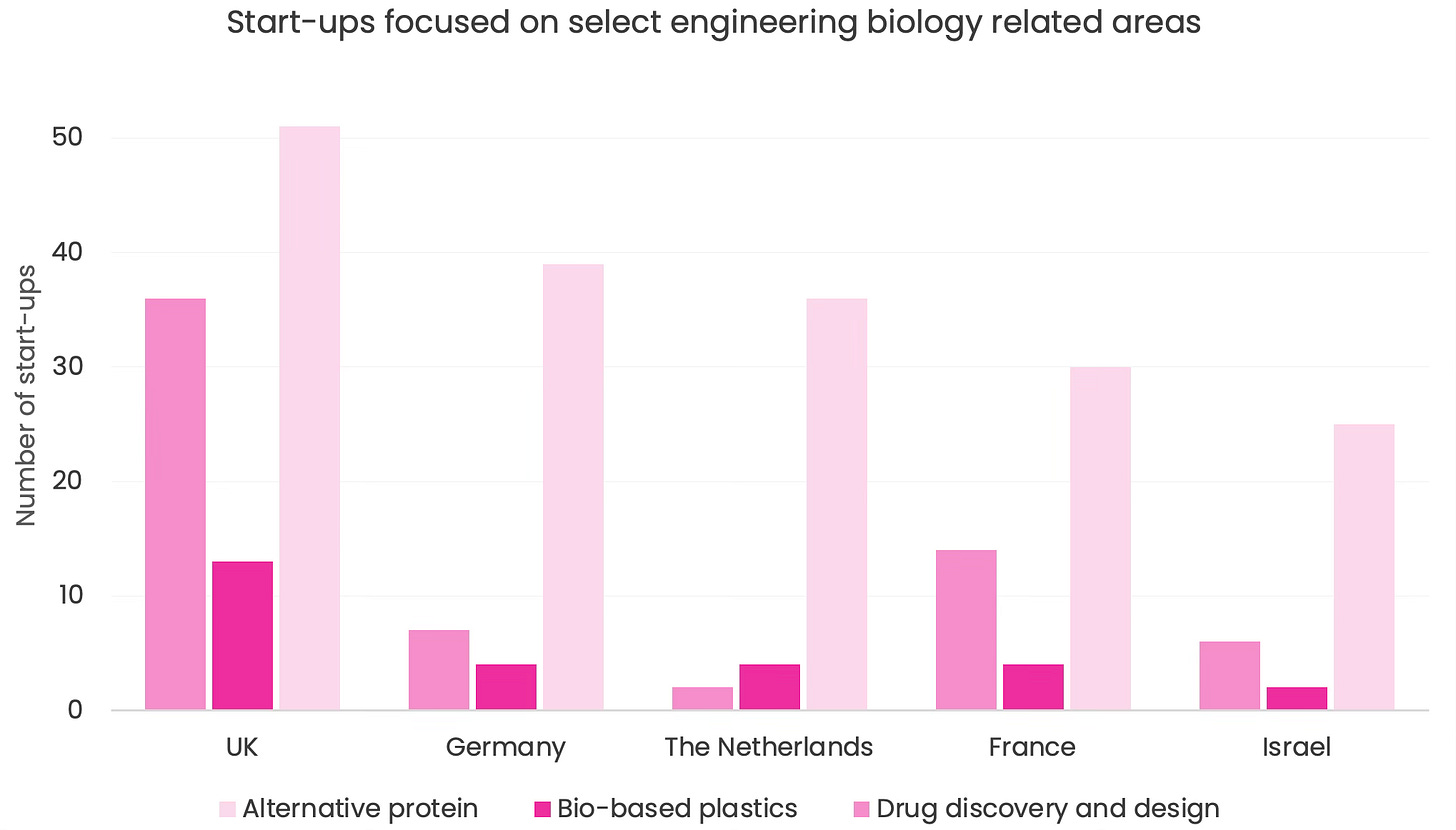
These non-health engineering biology fields have huge potential too – generating as much as $1.5 trillion in the years ahead.
Instead, our niche should be in AI. In engineering biology, it’s a massive area of growth: biology research publications involving AI have grown by 50% year-on-year since 2018.
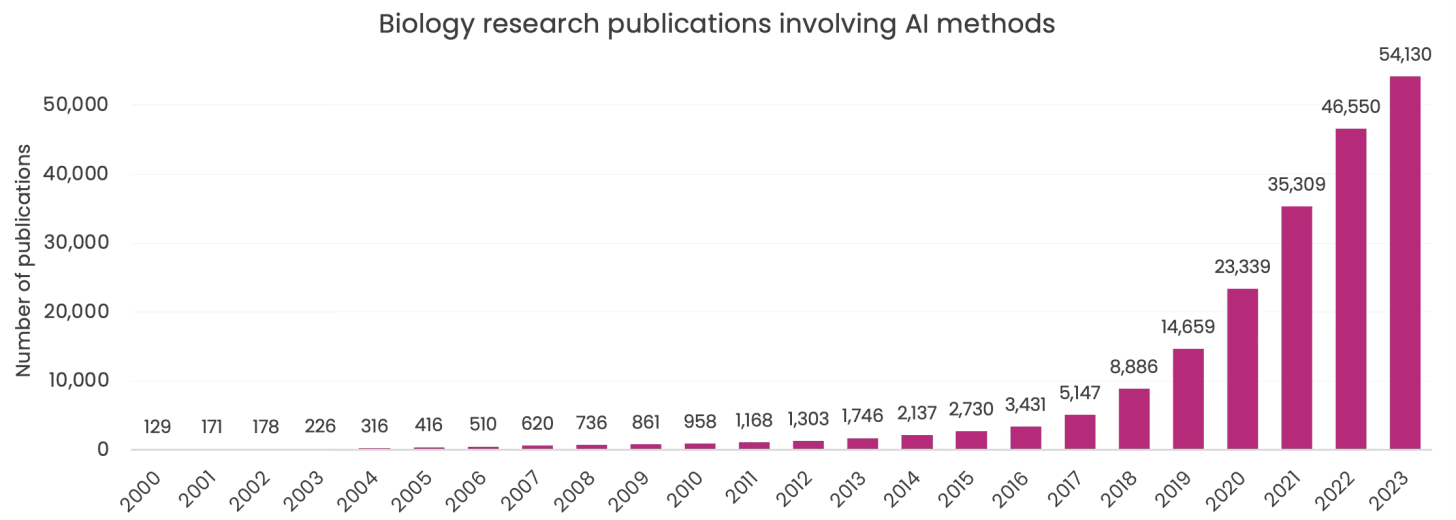
AI is at the heart of today’s cutting-edge breakthroughs, such as breeding drought-tolerant crops and producing novel materials for capturing carbon dioxide. This isn’t going to change anytime soon.
We know the UK has significant AI strengths, and even greater potential. But this relies on us tackling the barriers to drive forward home-grown foundation models. To lead in engineering biology, our biotech ecosystem should be teeming with these powerful models.
2. Investing in public goods
Beyond boosting foundation models, however, the UK faces three key barriers: data, talent, and facilities.
Data
AI-driven breakthroughs in engineering biology require AI models to be trained on copious amounts of biological data.
While the UK has the third largest data pool in the world, they’re not AI-ready. Huge resources such as NHS data and the UK Biobank languish untapped.
The UK will not lead in AI or engineering biology unless it can fix this. We need a British Library for Data, a national body focused on turning these datasets into AI-ready treasure troves.
Talent
The UK has some of the world’s top researchers, but having the best biologists alone won’t cut it. We need people with the ability to combine AI, biology and engineering expertise to push the limits of discovery, to take these to market, and scale businesses to success.
Here Britain struggles. Improving the talent pool in computer science is one of the UK pharma industry’s top concerns – and very few expect this to improve in the near future.
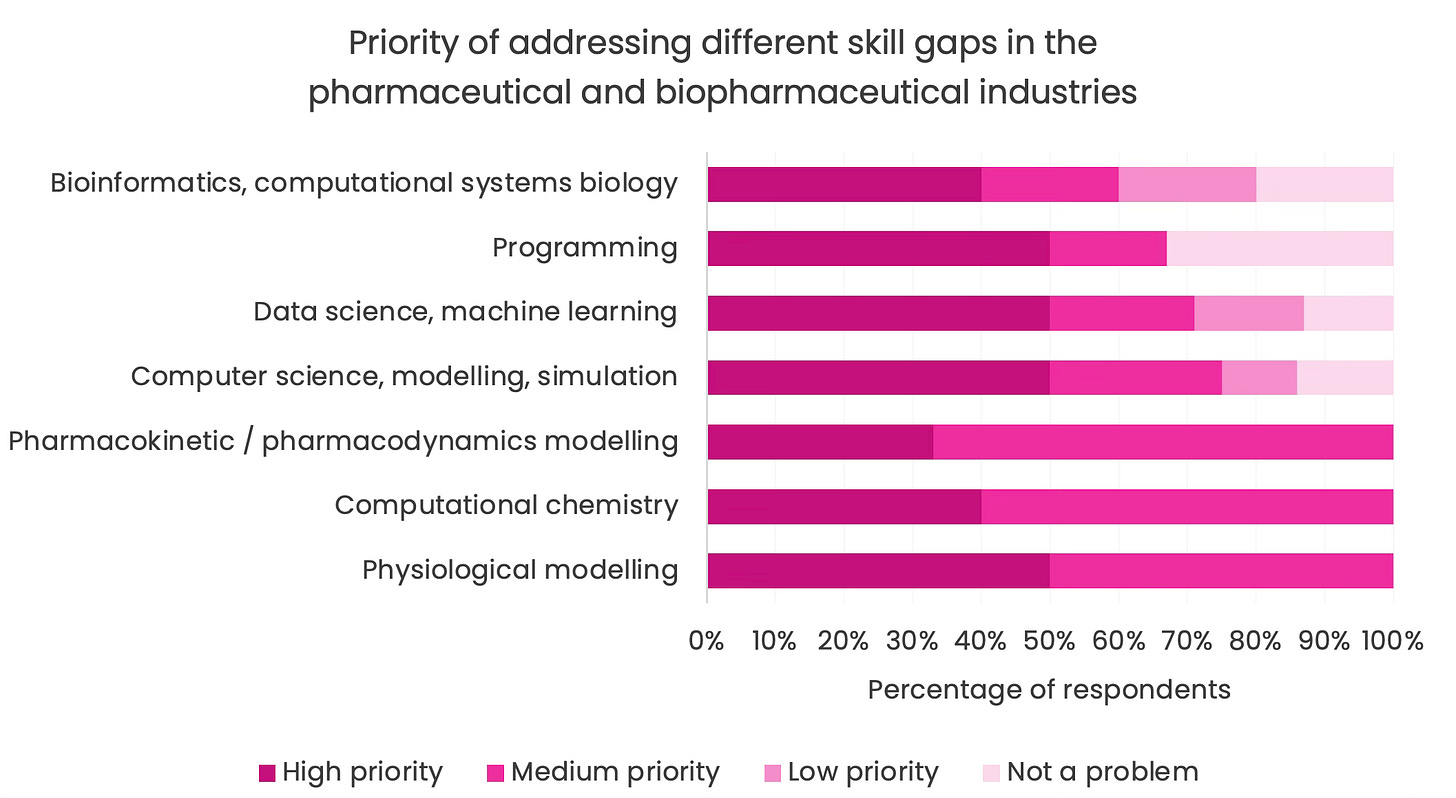
On the commercial side, a recent Government survey found that only 6% of the UK engineering biology community felt that the entrepreneurship programmes available to them (such as Innovate UK’s ‘Innovation-to-Commercialisation of University Research’) are working well.
And biotech CEOs overwhelmingly think the UK falls short in its pool of experienced managers who can effectively commercialise and scale biotech products.
Facilities
Commercialising and scaling require the right facilities, but here we fall short too. Cambridge may be a world-leading biotech hub, but its lab space is in cripplingly short supply, with a deficit across Cambridge and Oxford of two million square feet.
The Government itself has acknowledged that resource-constrained small and medium sized enterprises are often priced out of the specialist facilities they need. While there are incubators and accelerators that are expected to cater for these needs, they tend to target start-ups in their infancy, and not growth-stage companies.
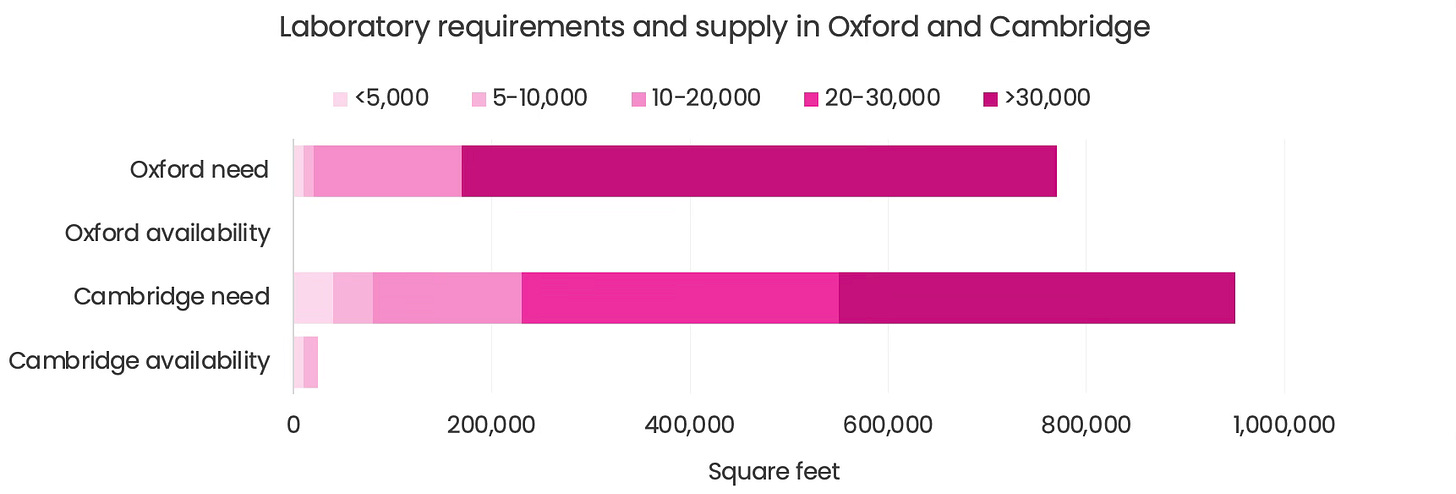
The UK also needs a central hub to pull together national expertise across the field – as called for by the Government’s Council for Science and Technology. We lack a hub to drive non-health engineering biology applications, particularly in testing and commercialisation. The Government is creating an Agri-Tech Catapult Centre, but this will only cover the farming side of things.
We need a national institute to drive the full spectrum of the UK’s engineering biology discovery and scale-up potential. The Government should establish a National Engineering Biology Institute. The institute would:
Provide state-of-the-art research facilities and physical scale-up capacity to fill the gap between the lab and commercial manufacturing
Bring together researchers and innovators from diverse fields and encourage collaboration between them
Be supported with the necessary AI compute infrastructure to power AI-driven engineering biology breakthroughs
Offer entrepreneurial training and have a dedicated commercialisation arm to support taking inventions to the marketplace
The Government should invest £100 million from the remaining funds from the £2 billion budget announced in the Engineering Biology Vision, with the plan to have this match funded by a charitable or philanthropic organisation.
3. Unlocking private enterprise
Britain has shown it can lead in regulating bioscience. Last year, it became the first to approve a therapy created with CRISPR technology – a game-changing new form of gene editing that massively cuts cost and complexity.
And from this year, the Medicines and Healthcare products Regulatory Agency (MHRA) will fast-track drugs that have already been approved by certain regulators abroad to free up resources elsewhere.
But despite some wins, overall our regulators are struggling to keep pace. The MHRA falls far short of its target to assess 98% of clinical trial applications in 30 days – with only a quarter evaluated on time. Despite legislation passed in March last year, the Food Standards Agency (FSA) is yet to say how it will regulate gene-editing.
Since 2021, the FSA has processed just 14% of the approval requests, and the regulator’s Chief Executive has openly admitted not being able to keep pace with novel food technologies.
The Government gets this. It has acknowledged that “failure to keep pace could see firms go abroad to more accessible markets.” And it has committed to an Engineering Biology Regulators’ Network, which is seeking applicants to take part in regulatory sandboxes.
But tackling this issue requires two things. First, to speed up, regulators need to tool up – they need the resources to be able to deal with the influx of new bio inventions hitting their rosters. Second, they need to focus on what really matters: protecting from real harm while not holding back innocuous innovations. More Onward research on this critical challenge will be published soon.
What’s next?
Next week, we’ll be focusing on the fourth of the Government’s five priority technologies: semiconductors — and explain why our ability to compete might rely on a few dozen scientists in Newport.











